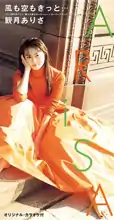| "Kaze mo Sora mo Kitto..." | ||||
|---|---|---|---|---|
 | ||||
| Single by Arisa Mizuki | ||||
| from the album Fiore II | ||||
| Released | April 20, 1996 | |||
| Genre | Pop | |||
| Length | 4:44 | |||
| Label | Nippon Columbia | |||
| Songwriter(s) | Chika Ueda | |||
| Producer(s) | Hiroyuki Ōtsuki | |||
| Arisa Mizuki singles chronology | ||||
| ||||
"Kaze mo Sora mo Kitto..." (風も空もきっと…, lit. "The Wind, the Sky, Surely...") is a song performed by Japanese recording artist Arisa Mizuki, featured as the seventh track on her third compilation album, Fiore II. It was released on April 20, 1996 as the second single from the album. Written by Chika Ueda, the song served as ending theme for the final season of the TV Asahi anime Sailor Moon, Sailor Stars.[1] Two versions of the song were used on the show: an initial version, arranged by Takao Konishi (episodes 167-172), and the actual single version (episodes 173-199), arranged by Hiroyuki Ōtsuki.
Chart performance
"Kaze mo Sora mo Kitto..." debuted on the Oricon Weekly Singles chart at number 24 with 14,130 copies sold in its first week.[2] The single charted for three weeks and has sold a total of 27,530 copies.[3][4]
Track listing
All tracks are written by Chika Ueda
| No. | Title | Arranger(s) | Length |
|---|---|---|---|
| 1. | "Kaze mo Sora mo Kitto..." (風も空もきっと… "The Wind, the Sky, Surely...") | Hiroyuki Ōtsuki | 4:44 |
| 2. | "Kaze mo Sora mo Kitto... (Original Karaoke)" | Ōtsuki | 4:44 |
| Total length: | 9:32 | ||
Charts and sales
| Chart (1996) | Peak position |
Sales |
|---|---|---|
| Oricon Weekly Singles[2] | 24 | 27,530[4] |
References
- ↑ Muell, Jason (April 17, 2017). "Which Real Life Singer Was the Basis for Rei Hino's Design?". Tuxedo Unmasked.
What makes this connection even more amazing is that Alisa Mizuki actually came full circle: she was used as the basis for a character design in the series, and then ultimately came to perform the Sailor Moon Sailor Stars ending song, Kaze mo, Sora mo, Kitto.
- 1 2 1996年05月第1週の邦楽シングルランキング情報 (in Japanese). Oricon. Retrieved 2011-08-07.
- ↑ 風も空もきっと…/観月ありさ (in Japanese). Oricon. Retrieved 2011-08-07.
- 1 2 ヴィジョンファクトリー(旧ライジング)@売上データ補完スレ (in Japanese). 2004-01-20. Archived from the original on 2012-03-24. Retrieved 2011-08-07.